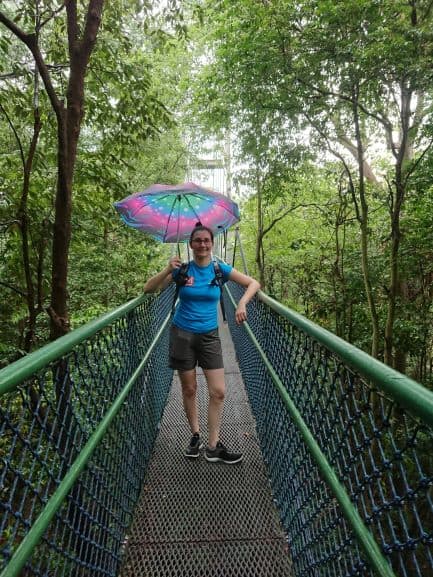Ana Rakonjac is an experimental physicist at a quantum technology start-up in Singapore. She spoke to Margaret Harris about her life and work there.
This post is part of a series on how the COVID-19 pandemic is affecting the personal and professional lives of physicists around the world. If you’d like to share your own perspective, please contact us at pwld@ioppublishing.org.

I work as a senior research scientist at a company called Atomionics. We are developing cold atom-based quantum sensors for gravimetry and navigation. We’re an early-stage start-up, and most of my effort is in developing our prototype device along with a small interdisciplinary team. Nearly all our work is lab-based, and it involves a mix of optics, spectroscopy, vacuum work, electronics and mechanical engineering.
The situation in Singapore is presently well-controlled, although things are changing fast: over the past weekend, the country shut its borders to short-term visitors and people on working visas who are not doing essential jobs. However, the health system appears to be designed to cope with an outbreak of this nature, and my impression is that the government had a solid outbreak response plan from before Day One. A test for detecting COVID-19 was developed early, and every confirmed case – mild or not – is hospitalized. Patients are only discharged once they test negative for the virus. This ensures that an infected person cannot infect others in the community. Additionally, contact tracing is quickly performed, and anyone deemed at risk is issued a “stay home” notice, meaning they are quarantined in their home for two weeks. If they develop symptoms during this time, they are immediately taken to the hospital via ambulance.
The quarantine is taken very seriously. The authorities will check in with you every day, and you can be fined, jailed and/or deported if you don’t comply. This has severely limited community spread of the virus. The government quickly implemented measures to support people who are quarantined, such as ensuring that they get extra sick leave and don’t lose their jobs if they can’t work from home, plus there are some big stimulus packages planned. Additionally, COVID-19 tests and hospitalization are free for residents. So far, only two people have died – although again, things are changing fast.
A number of social distancing measures have been put in place, including banning large gatherings of people. This includes large religious services, which were the source of two local disease clusters. Universities have been doing some distance teaching since February, but schools remain open. Travellers from a growing list of countries have been issued “stay home” notices, but as of this week, everyone coming into Singapore must self-isolate for two weeks. This is a good move, considering that around 75% of our cases at the moment are imported. Other than that, most places seem to be open and in business, but there are far fewer people in the usual tourist hotspots.
Local responses
As for how people have responded, there was initially some panic in the city (lots of panic-buying of hand sanitizer, masks and rice, though not toilet paper) back in early February, but my neighbourhood is pretty relaxed, and the local shops weren’t particularly depleted. The government took quick action to reassure people that there is no danger of running out of food and other essentials, and I think it did a good job. People take your temperature everywhere! You get scanned when you go to the gym, before commencing cosmetic appointments, when entering large office buildings, and so on. Everything is being disinfected constantly and there is hand sanitizer available everywhere now.
We have a number of people lined up from different countries, but now we have no idea when or if they’ll be able to join us.
The impact to me personally has been minimal. It’s been business as usual for the most part. However, after the recent spike in imported cases, my husband and I decided to quit going to the gym for the time being and avoid any busy local attractions that might attract crowds. The infection numbers here could easily explode, particularly because of the out-of-control outbreaks in Europe and the US. We’ll know in a week or so if Singapore was too late in increasing travel restrictions, so we’re laying low until then at least.
My workplace has also not been affected on a day-to-day level; we are a small company, so the local population density is not high. However, we’ve had major supply chain problems. First, with China, where several orders got stuck in limbo – they were ready to ship, but there was no one to ship packages and no one to deliver them. Many local suppliers also heavily rely on China, so we were unable to use them. We turned to manufacturers in India, and things were going well until the second week of March, when they also started shutting down. We’ve been hurriedly trying to procure all we need for the next few months because although we expected more global shutdowns, I personally didn’t expect it to happen so fast.
COVID-19: how physics is helping the fight against the pandemic
Over the last several days, some European suppliers have gone from saying they expected no delays to suddenly shutting down their facilities. I think things will continue to be unreliable for months, since there is no way that two-week shutdowns will be enough to stem the spread of the pandemic. We will have to find some creative solutions. One thing that’s extremely uncertain is the recruitment of new staff and interns. We have a number of people lined up from different countries, but now we have no idea when or if they’ll be able to join us.
Keeping perspective
If we’re lucky, the present measures to stem a widespread local outbreak will work, and we can carry on with our current levels of social distancing. There’s always a lot to do in the lab, so unless there’s a city-wide shutdown, it’ll be work as usual and quiet weekends. I have a trip to Portugal booked for mid-May for a friend’s wedding, but I suspect that it’s not going to happen. If we do have a full lock-down and I run out of work I can do from home, I’ll take up a few creative projects I have on the go.
Professionally, much of the world is in the same boat. To put things in perspective, the world is collectively trying to stop millions of people from dying, so if careers and businesses suffer a bit, it’s a price I’m happy to pay. You can always rebuild economies, but you can’t bring people back.
If we’re lucky, the present measures to stem a widespread local outbreak will work
On a personal level, I’m worried for my family in Europe. My sister is in lock-down in Barcelona, and I have other family in Germany. I have many friends in the US and UK, and I seriously worry for their safety and well-being, given the slow government responses to the outbreak. As for me, I have asthma, which puts me in a higher-risk category if I contract the virus, but I feel confident in the health system here (as long as it doesn’t get overwhelmed).
As for a silver lining? I hope that essential workers start getting treated better, in the form of much higher pay and benefits, and also respect. It’s obvious that without supermarket staff, sanitation workers, carers, and so on, society simply cannot function. Not to mention nurses, who are underpaid and overworked in so many countries, but are literal lifesavers. Maybe we’ll see some improvement to society, if we’re lucky.
Another silver lining for me is morbid glee every time a politician who dismissed coronavirus as a non-threat gets diagnosed with coronavirus. Naturally, I hope all these people make a full recovery – but I also hope they get voted out at the next opportune moment. Some of them deserve criminal charges for causing widespread death by negligence, and I look forward to seeing their (political) demise.




